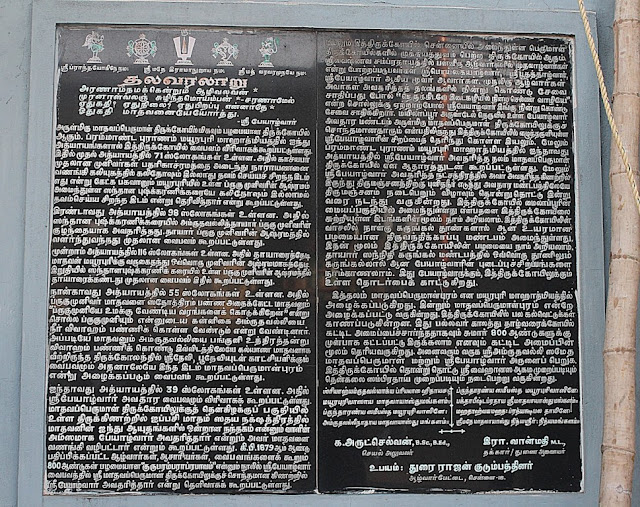Madhava Perumal Temple, Mylapore – The Temple
The
temple is built in Dravidian architecture and has two precincts. The temple has a
rectangular plan surrounded by 10 ft (3.0 m) high walls, pierced by a
5-tier gopuram, the gateway tower, which was renovated and consecrated
40 years ago. Two more Samprokshanams were performed in the last 40 years, once
in 1977 and again in 1992. The temple of Madhava Perumal is said to be very
ancient and is facing east, though its history is traced back to only 800 years
from now, according to available records. Many interesting stucco images are
found on the Rajagopuram.
A mandapam
is found in front of the tower, where all the pillars have bas-relief images. Presiding
Deity is called as Madhava Perumal. The presiding deity is housed in the
sanctum and is an image made of granite. The deity is seen in seated posture
with images of Sridevi and Bhoomadevi on either side. The Lord is hailed as Kalyana
Madhavan as he married Goddess Amirthavalli, who was born as Sage Bhrigu
daughter here.
Though
the Lord in similar posture in other places and is called Paramapadanathan
holding the Sudarsana, Panchajanya and Gadhayutha in his three hands with the
fourth one in Abhaya Hastha pose, the Lord's idol here has no Gadhayutha. Utsavar
appears with a pretty face like the lotus flower, hence he is called as Aravinda
Madhavan, ‘Aravindam’ meaning ‘lotus flower’. Utsavar is in standing posture
with Sridevi and Bhoodevi on either side and housed in the sanctum.
This
Sampathkumaarar remains as Utsavar here. Near his feet is Bibi
Naachiyaar, the daughter of the Delhi king. The belief is
that by praying to this Lord the family will become affluent. Hence,
He is also named ‘Selva Pillai’. The Vimanam in the temple, like the one
in Tirumala (Tirupati), is known as "Ananda Nilaya Vimanam." Rituals
are performed according to the Vaikhanasa Agama. With the Kalyana Mandapam,
Alankara Mandapam and "Palliyarai" the temple is an imposing
structure in this part of the city.
The
shrine of Garuda facing Madhava Perumal, the eagle mount (Vahana)
of Vishnu, is located axial to the central shrine. The flag staff, bali peetha
and Garuda are found facing towards the sanctum. There are images of Azhwars in
the worship hall on both sides. The central shrine is approached through a
worship hall and a narrow Ardha mandapam. In Ardha Mandapam, many bronze idols are located. They
include Ram-Sita-Lakshman, Vishnu-Sri Devi-Bhoo Devi, Madhava and Krishna.
In Maha
Mandapam, there are shrines of Peyalvar, Alwars, Senai Mudalvar, Ramanuja,
Manavala Mamunigal, Poigai Alwar, Bhoodat Alwar. All these shrines have their
corresponding bronze idols. Mother is called as Amirthavalli. The shrine of
Amirthavalli is located on the western side of the temple in the second
precinct. Thayar Shrine is located to the right side of the sanctum. The Mukha
Mandapam and Maha Mandapam have a lot of interesting and beautiful sculptures
on the pillars.
On the
pillars of the mandapam in front of the sanctum of Thaayar, images of
Peyalvar on the carriers such as parrot, elephant, horse and on sun-disc are
sculpted. The temple tank where the Goddess was born is present near the shrine
of Amrita Valli. There is a separate shrine for Andal, but her Utsava idol is
kept in the Lord's sanctum sanctorum. Her Tiruppavai songs have been inscribed
on the walls of the shrine. Very near to the Paramapatha Vasal is the Kodanda
Ramar shrine where along with him Sita, Lakshmana and Anjaneya are worshipped.
The idol
of Lord Bhu Varaha, with his consort sitting on his left lap in a separate
shrine on the banks of the Pushkarani, is a thing of beauty to watch and
worship forever. The temple has a special shrine for Peyalvar who was born in
Mylapore. Mother Amirthavalli is believed to be born in
the Pushkarini here on a Maasi Magam day. Hence, the Pushkarini is
called Santhaana Pushkarini. The holy tree of this shrine is the
Punnai tree (Bot. name: Calophyllum inophyllum) meant for Lord Krishna and the tree
can be seen behind the main sanctum.
The most
eye-catching feature is two four pillared mandapas (pavilions): one is located
before the Rajagopuram and the taller one inside the south corridor houses the
Vishwaroopam form of Anjaneya with folded hands facing the sanctum. The roofs
exhibit exclusive angled patterns of squares. The square bases of pillars of
the mandapas have the ornate bas relief images, depicting various forms of Lord
Vishnu and his consorts, associate deities and Alvar saints.
There
are epigraphical inscriptions dating to 11th to 13th century in Moolavar Sannidhi, Senai
Mudaliyar Sannidhi and on the steps outside Thayar Sannidhi. The
inscription outside Thayar Sannidhi mention about one Vadana Perumal donation
for lighting lamp in the temple. The devotees consider Mundaga Kanni Amman
(Lotus-eyed Goddess) Amman worshipped in a separate temple very near the
Madhava Perumal temple as "Yoga Maya" who was born as the sister of
the Lord during his incarnation as Krishna.













































